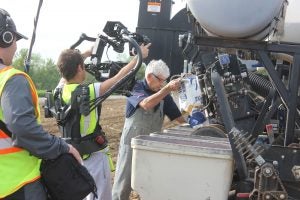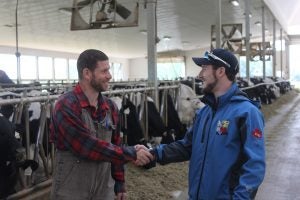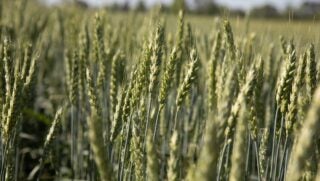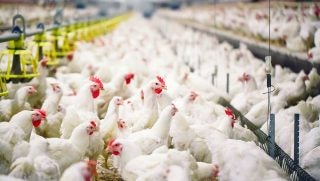The motivation behind an ambitious film project, which sets out to show today’s farmers in an honest and human light, has roots in one of the most unlikely sources: a PETA video.
Not long ago, Dylan Sher, an agriculture student at the University of Guelph in Ontario, was spending his days working on a dairy farm, doing menial tasks but proud of his work nonetheless.
Then PETA’s video came along. You know the kind — menacingly edited, agenda-driven, and industry tarnishing. It’s the kind of video Sher’s former self would’ve eagerly shared with friends. But looking at the cleanliness of the dairy farm he was working at, and viewing agriculture not from the eyes of a city kid but from those of someone who has spent time around farmers, he saw PETA for what it was: Dead wrong.
“I was so upset,” he said.
He identified as part of the agricultural community even though all he was doing was sweeping the floor.
“‘Before the Plate’ was the brainchild of a very early morning and a lot of dirt and dust and steam,” Sher said. “My mind began to wander.”
It went from Sher posting a photo about farming to posting a short video to making a longer video. Sher was determined to correct the public’s misperceptions about agriculture. Now, he’s on track to have the documentary completed in time to submit to the 2018 Toronto International Film Festival.
From a young age, Sher was drawn to agriculture, but growing up in the city, he viewed conventional production more adversely than he does today. He was standoffish about the ag industry — the size and scale so impersonal. The information he had access to was limited.
“When I starting meeting all of these kids at university who I had never encountered before, I started to learn that the so-called ‘factory farm’ doesn’t really exist to the degree the public believes it does,” he said. “And even if it did, just because a farm has a massive amount of acres or a massive amount of livestock doesn’t mean it’s not still run by a family.
“Too often, it’s believed that there’s a faceless, heartless corporation who tortures animals behind big farms, and it’s simply not true.”
Forging a connection between buyer and grower is a key message of “Before the Plate.” And Sher is being very strategic in his delivery and in his efforts to engage the right people. There are other farming movies out there, but most never get seen (or, if they have, it’s “Food Inc.”). Sher doesn’t want that fate for his film.
“Before the Plate” “is a food movie more than a farming movie,” he said, “though everything will revolve around the farm. But we’re doing that so that it will reach an urban audience.”

The movie will open inside the upscale Canoe restaurant, which sits 54 floors above Toronto’s financial district (next year’s debut party for the film will be held at this same restaurant). We will see the chef and learn why he selects the ingredients that he does.
From one plate that he puts together, the film will follow each ingredient back to the farm. Even better is that the audience will see that the ingredients shipped to high-end restaurants are the same ones that end up on grocery-store shelves.
It all starts at the farm, and access to quality ingredients is available.
Sher spoke exclusively with AGDAILY about his passion and the goals of his project.

If you had to label your film with an overarching theme, what would it be?
This is one of the feel-good farming films. Even though I went from being an anti-GMO person to a pro-GMO person, the film will be more centric than that. We’ll meet people with different opinions in the film because we’re not pushing an agenda. … We’re just putting it all out there, and we’re hoping that people will be a lot more responsive to farming as a whole because of it. We do feature an organic farmer, but the rest of our farms are conventional ones. We’ll talk about GMOs and seed treatments. I want to answer every concern that the consumer would have. … It’s an overarching journey back to the farm to learn what our food process looks like.
What would your old self say has been the most jarring discovery during the filmmaking process?
That farmers are people. I’d say that the average urban consumer is confused. In my background, as a small kid, I saw “Food, Inc.” and told my mom that we should only buy organic. It was because I thought we were supporting an individual farmer by doing that, and that if we didn’t buy organic, then that meant we were supporting some faceless entity. Everything in recent years has changed that perception. … In reality, if most farmers took a moment to shake someone’s hand, that would be enough for most people to be satisfied with what they do on their operations. People don’t question farmers too much, they question the industry. And if people understood that regular, real people are growing crops, then the public wouldn’t have an issue with it.
What do you hope the impact of your film is?
The most realistic goal for me is my film prompts someone to take one extra second before they click the “share” button to think whether the information is true or not. There might be a few people who have a complete eye-opening experience, but I don’t think that’s the goal of the film. I’m not trying to turn vegans into meat-eaters or meat-eaters into vegans. Rather, I hope that a person whose mind doesn’t change won’t demonize someone on the other side. I want someone who sees a PETA video about the dairy industry to pause a moment, think about the movie, and say, “Oh, this probably isn’t true. I’m going to do more research.”
Seeing everything you’ve seen, how long is the road ahead toward changing the public’s perceptions?
I think it’s long, but I don’t think it would be that difficult on a united front. I think 90 percent of the public just doesn’t have a full grasp of the situation. I think there are very few people who are die-hard anti-conventional activists. The majority of the population are concerned parents and so on. They are the people who buy the non-GMO label, but they’re not the ones protesting in the street — they’ve just been led to believe that that’s the only healthy option. However, I do believe that if 80 percent of them spoke to a farmer, they would be satisfied with how conventional food is produced. It’s all about getting the right message to them.
What have you learned about yourself along the way?
I used to give an opinion on something that I didn’t fully understand. Today, however, I just won’t say something if I don’t have a better understanding of it. Whether the goal is political or whatever, the easiest thing to do is read the headline and go, “Yeah, that terrible” and click the share button. We shouldn’t be doing that. My biggest learning experience hasn’t come from making the movie, per se, but they are the reasons why I’m making the movie. There’s a lot of learning to be done.
To connect with “Before the Plate’s” journey, follow them on Facebook and on Instagram and stay tuned to AGDAILY.com. Click here to donate to “Before the Plate’s” Kickstarter campaign.



